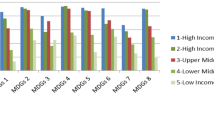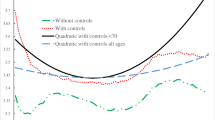Abstract
This paper analyses whether the aggregation of individual happiness scores to a National Happiness Index can still be trusted once governments have proclaimed their main objective to be the pursuit—or even maximization—of this National Happiness Index. The answer to this investigation is clear-cut: as soon as the National Happiness Index has become a policy goal, it can no longer be trusted to reflect people’s true happiness. Rather, the Index will be systematically distorted due to the incentive for citizens to answer strategically and the incentive for government to manipulate the Index in its favour. Such a distortion would arise even if the measurement of subjective well-being correctly reflected actual happiness before the intervention of government. Governments in a democracy should establish the conditions enabling individuals to become happy. The valuable and important results of happiness research should be introduced into the political process. Each person should be free to pursue happiness according to his or her preferences. This process is supported by obedience to the rule of law, human rights and free media, as well as by extended political participation rights, decentralized public decision-making, an open and effective education system fostering upward mobility and the possibility to find suitable employment.
Similar content being viewed by others
Notes
Van Praag and Kapteyn (1973) and Easterlin (1974) are pathbreaking. See the surveys by Frey and Stutzer (2002a, b, c, 2005), Di Tella and MacCulloch (2006), Dolan et al. (2008), Frey (2008), and the collection of articles by Easterlin (2002, 2010), Eid and Larsen (2008), Dutt and Radcliff (2009), Frey and Stutzer (2012).
In line with the literature, however, the more appealing term “happiness” will be generally used whenever there is no danger of misunderstanding.
On this and the following, see, e.g., Dafflon and Rossi (1999), Forte (2001), Milesi-Ferretti (2004), Koen and Van den Noord (2005), Von Hagen and Wolff (2006), Balassone et al. (2007), Buti et al. (2007), Sachverständigenrat zur Begutachtung der gesamtwirtschaftlichen Entwicklung (2009) and European Commission (2010).
References
Alesina A, Di Tella R, MacCulloch R (2004) Inequality and happiness: are Europeans and Americans different? J Public Econ 88:2009–2042
Balassone F, Franco D, Zotteri S (2007) The reliability of EMU fiscal indicators: risks and safeguards. Working paper 633, Banca d’Italia
Benz M, Frey BS (2008) Being independent is a great thing: subjective evaluations of self-employment and hierarchy. Economica 75:362–383
Brennan G, Buchanan JM (1985) The reason of rules: constitutional political economy. Cambridge University Press, Cambridge
Buchanan JM, Tullock G (1962) The calculus of consent: logical foundations of constitutional democracy. University of Michigan Press, Ann Arbor
Buti M, Martins JN, Turrini A (2007) From deficits to debt and back: political incentives under numerical fiscal rules. Cesifo Econ Stud 53:115–152
Clark AE, Oswald AJ (1994) Unhappiness and unemployment. Econ J 104:648–659
Csikszentmihalyi M (1992) Flow: the psychology of happiness. Rider, London
Dafflon B, Rossi S (1999) Public accounting fudges towards EMU: a first empirical survey and some public choice considerations. Public Choice 101:59–84
Davies JC (1970) The J-curve of rising and declining satisfactions as a cause of some great revolutions and a contained rebellion. In: Graham HD, Gurr TR (eds) The history of violence in America. Bantam, New York
De Neve JE, Christakis NA, Fowler JH, Frey BS (2012) Genes, economics, and happiness. J Neurosci Psychol Econ 5:193–211
De Prycker V (2010) Happiness on the political agenda? Pros and cons. J Happiness Stud 11:585–603
Deaton AS (2012) The financial crisis and the well-being of Americans. 2011 OEP hicks lecture. Oxf Econ Pap 64:1–26
Di Tella R, MacCulloch R (2006) Some uses of happiness data in economics. J Econ Perspect 20:25–46
Di Tella R, MacCulloch RJ, Oswald AJ (2001) Preferences over inflation and unemployment: evidence from surveys of happiness. Am Econ Rev 91:335–341
Diener E (ed) (2009) The science of well-being—the collected works of Ed Diener. Springer, Dordrecht
Diener E, Chan MY (2011) Happy people live longer: subjective well-being contributes to health and longevity. Appl Psy Health Well-Being 3:1–43
Diener E, Suh EM (eds) (2000) Culture and subjective well-being. MIT Press, Cambridge
Diener E, Inglehart R, Tay L (2012) Theory and validity of life satisfaction scales. Soc Indic Res. Advance online publication. doi:10.1007/s11205-012-0076-y
Dolan P, Peasgood T, White M (2008) Do we really know what makes us happy? A review of the economic literature on the factors associated with subjective well-being. J Econ Psychol 29:94–122
Dutt AK, Radcliff B (eds) (2009) Happiness, economics and politics: towards a multi-disciplinary approach. Edward Elgar, Cheltenham
Easterlin RA (1974) Does economic growth improve the human lot? Some empirical evidence. In: David PA, Reder MW (eds) Nations and households in economic growth: essays in honour of Moses Abramowitz. Academic Press, New York
Easterlin RA (ed) (2002) Happiness in economics. An Elgar Reference Collection, Cheltenham
Easterlin RA (2010) Happiness, growth, and the life cycle. Oxford University Press, New York
Eid M, Larsen RJ (eds) (2008) The science of subjective well-being. Guilford, New York
European Commission (2010) Report on greek government deficit and debt statistics. COM 1, Brussels
Feierabend IK, Feierabend RL (1966) Aggressive behaviors within polities, 1948–1962: a cross-national study. J Confl Resolut 10:249–271
Forte F (2001) The Maastricht “excessive deficit” rules and creative accounting. In: Mudambi R, Navarra P, Sobbrio G (eds) Rules and reason: perspectives on constitutional political economy. Cambridge University Press, Cambridge
Franklin SS (2010) The psychology of happiness. A good human life. Cambridge University Press, Cambridge
Frey BS (2008) Happiness: a revolution in economics. The MIT Press, Cambridge
Frey BS (2011) Happy people live longer. Science 331:542–543
Frey BS, Gallus J (2012) Happiness policy and economic development. Int J Happiness Dev 1(1):102–111
Frey BS, Gallus J (2013) Political economy of happiness. Appl Econ (in press)
Frey BS, Stutzer A (1999) Measuring preferences by subjective well-being. J Inst Theor Econ 155:755–778
Frey BS, Stutzer A (2002a) What can economists learn from happiness research? J Econ Lit 40:402–435
Frey BS, Stutzer A (2002b) Happiness and economics: how the economy and institutions affect human well-being. Princeton University Press, Princeton
Frey BS, Stutzer A (2002c) The economics of happiness. World Econ 3:25–41
Frey BS, Stutzer A (2005) Happiness research: state and prospects. Rev Soc Econ 63:207–228
Frey BS, Stutzer A (2012) The use of happiness research for public policy. Soc Choice Welf 38:659–674
Gregg P (1994) Out for the count: a social scientist’s analysis of the unemployment statistics in the UK. J Roy Stat Soc A 157:253–270
Gurr TR (1970) Why men rebel. Princeton University Press, Princeton
Inglehart R, Klingemann HD (2000) Genes, culture, democracy, and happiness. In: Diener E, Suh EM (eds) Culture and subjective well-being. MIT Press, Cambridge
Kahneman D, Krueger AB (2006) Developments in the measurement of subjective well-being. J Econ Perspect 20:3–24
Kahneman D, Diener E, Schwarz N (eds) (1999) Well-being: the foundation of hedonic psychology. Russell Sage Foundation, New York
Kahneman D, Krueger AB, Schkade D, Schwarz N, Stone A (2004) A survey method for characterizing daily life experience: the day reconstruction method (DRM). Science 306:1776–1780
Koen V, Van den Noord PJ (2005) Fiscal gimmickry in Europe: one-off measures and creative accounting. Working paper 417, OECD Economic Department
Lane RE (2000) The loss of happiness in market economies. Yale University Press, New Haven
Lyubomirsky S (2008) The how of happiness: a scientific approach to getting the life you want. Penguin Press, New York
Meier S, Stutzer A (2008) Is volunteering rewarding in itself? Economica 75(297):39–59
Milesi-Ferretti GM (2004) Good, bad or ugly? On the effects of fiscal rules with creative accounting. J Public Econ 88:377–394
Minford P (1983) Labour market equilibrium in an open economy. Oxf Econ Pap 35:207–244
Oswald AJ, Powdthavee N (2008) Death, happiness, and the calculation of compensatory damages. J Legal Stud 37:217–252
Sachverständigenrat zur Begutachtung der gesamtwirtschaftlichen Entwicklung (2009) Die Zukunft nicht aufs Spiel setzen. Available via http://www.sachverstaendigenrat-wirtschaft.de/jahresgutachten-2009-2010.html. Cited 18 June 2012
Schneider F (ed) (2011) Handbook on the shadow economy. Edward Elgar, Cheltenham
Schneider F, Enste D (2002) The shadow economy: theoretical approaches, empirical studies, and political implications. Cambridge University Press, Cambridge
Simmons JP, Nelson LD, Simonsohn U (2011) False-positive psychology: undisclosed flexibility in data collection and analysis allows presenting anything as significant. Psychol Sci 22:1359–1366
Stutzer A, Frey BS (2008) Stress that doesn’t pay: the commuting paradox. Scand J Econ 110:339–366
The Economist (2012a) California—not quite Greek, but still weak. The Economist, 16 June 2012
The Economist (2012b) Official statistics—don’t lie to me, Argentina. The Economist, 25 Feb 2012
Torgler B, Schneider F, Schaltegger C (2010) Local autonomy, tax morale, and the shadow economy. Public Choice 144:293–321
Van Praag BMS, Kapteyn A (1973) Further evidence on the individual welfare function of income: an empirical investigation in The Netherlands. Eur Econ Rev 4:33–62
Veenhoven R (1989) Conditions of happiness. Reidel Publishing Company, Dordrecht
Von Hagen J, Wolff GB (2006) What do deficits tell us about debt? Empirical evidence on creative accounting with fiscal rules in the EU. Discussion Paper 148, Governance and the Efficiency of Economic Systems, Frankfurt am Main
Webster D (2002) Unemployment. How official statistics distort analysis and policy and why. Radical Statistics 79/80
Wilson TD, Gilbert DT (2003) Affective forecasting. Adv Exp Soc Psychol 35:345–411
Author information
Authors and Affiliations
Corresponding author
Rights and permissions
About this article
Cite this article
Frey, B.S., Gallus, J. Subjective Well-Being and Policy. Topoi 32, 207–212 (2013). https://doi.org/10.1007/s11245-013-9155-1
Published:
Issue Date:
DOI: https://doi.org/10.1007/s11245-013-9155-1




